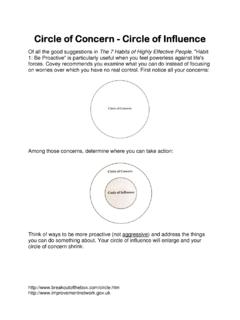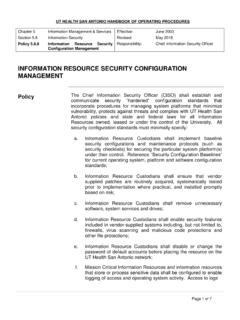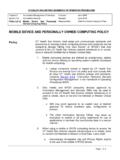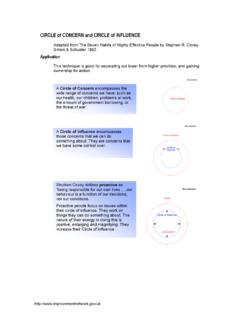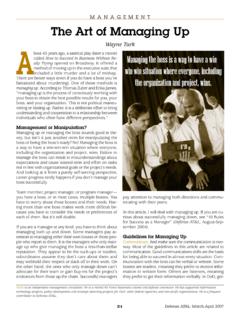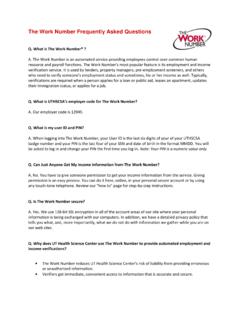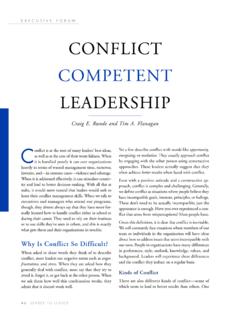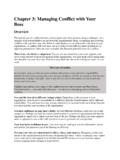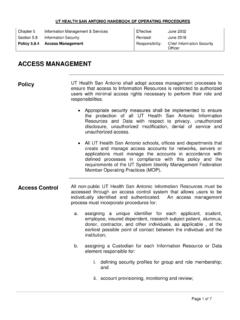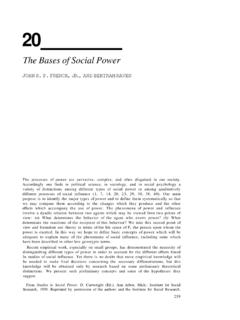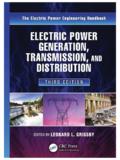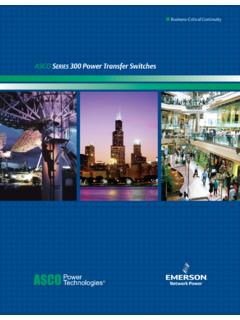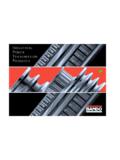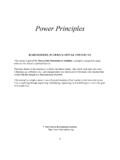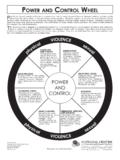Transcription of Leadership As A Function Of Power - UT Health …
1 APMPFall 199954 PROPOSALM anagementLeadership as a Function of PowerHow can Power be used to influencebehavior? How many types ofpower exist? Which are most likelyto produce the compliance and commit-ment we seek from subordinates and peers?These kinds of questions have been studiedand discussed for centuries. A scholarlyanalysis of recent research is offered byGary A. Yukl, State University of New Yorkat Albany, in his several textbooks on lead-ership. Specifically, his textbook, Leadership in Organizations, SecondEdition, published in 1989, reviewed theresearch to date on Power and how it influ-ences behavior and Leadership effective-ness. Two of his tables on the subject andselected short excerpts are included considered whether effective leadershave more Power or different sources ofpower than ineffective leaders, andwhether they exercise Power in differentways.
2 His findings are particularly germaneto proposal management professionals whomay correlate persuasion and influence asone and the same. RESEARCH ON Power ANDEFFECTIVENESSYukl found that most research classifiedfive different types of leader Power , relyingupon the Power taxonomy proposed byFrench and Raven in their Studies ofSocial Power . Their classifications are listedin Table 1 on the following As AFunction Of PowerGary Yukl s research on Leadership provides us with insights into theuse of Power and how its components can influence the behavior ofsubordinates and R. Dennis GreenAPMPFall 199955 PROPOSALM anagementLeadership as a Function of PowerGUIDELINES FOR INFLUENCINGSUBORDINATESHow do these types of Power influence behavior and whattype of outcome does each produce? Yukl s findings aresummarized in Table 2.
3 By drawing upon a diverse litera-ture in the social sciences that includes research on Power ,leader behavior, motivation, communication, counseling,supervision, and conflict resolution, it is possible to devel-op some tentative guidelines for leaders, he writes. Theseguidelines vary in degree of empirical support; some arefairly well supported, while others are mostly , for managers faced with the immediate necessityof influencing others, the guidelines provide the best The guidelines are usually phrased in terms ofleader influence attempts with but most ofthe principles underlying guidelines apply equally well toinfluence attempts with peers, and many apply to influenceattempts with superiors. Clearly, as persuaders, we have an interest in gaining com-pliance with our requests and objectives. Complianceisone of three potential outcomes.
4 The two types of powermost likely to produce compliance are reward powerandlegitimateor position Power , such as that attendant topositions of manager or chief. In the context of legitimate Power , Yukl explains thatauthority is exercised by making a legitimate request,either verbally or in written form. A polite request is moreeffective than an arrogant demand. Compliance with therequest is more likely if it is perceived to be within theleader s scope of authority. An illegitimate request is likely tobe ignored, or otherwise resisted, especially if the requestedactivity is tedious, dangerous, or unpleasant. Legitimaterequests should be made in a clear, concise manner, usinglanguage that the target person can easily poweris most commonly used by making anexplicit or implicit promise to give a person somethingunder the leader s control for carrying out a request or per-forming a task.
5 Compliance is most likely if the reward issomething valued by the target person. Recent researchalso suggests that effective managers provide sincere, publicrecognition to subordinates in the form of awards, cere-monies and special symbols. Significant rewards accompanythe recognition, but the focus is on the person s contribu-tions and achievements, not on the reward. Used in thisway, reward Power can be a source of increased referentpower over an even more desirable outcome becauseof the trust and emotional pledge that it is most likely when the powers used are expertand Power is commonly exercised in the form of rationalpersuasion. The leader presents logical arguments and sup-porting evidence for a particular proposal, plan, or depends on the leader s credibility and persuasivecommunication skills in addition to technical knowledgeand logical or analytical ability.
6 Proposals or requestsshould be made in a confident manner, and the leadershould avoid making contradictory statements or vacillat-ing between inconsistent positions. Expert Power is based on a knowledge differential betweenthe leader and the target person. Rational persuasion ismost effective when the target person shares the leader of PowerReward powerCoercive Power Legitimate Power Expert Power Referent powerDescriptionThe target person complies in order to obtain rewards he or she believesare controlled by the target person complies in order to avoid punishments he or shebelieves are controlled by the target person complies because he or she believes the agent has theright to make the request and the target person has the obligation to target person complies because he or she believes that the agent hasspecial knowledge about the best way to do something.
7 The target person complies because he or she admires or identifies withthe agent and wants to gain the agent s 1. Power TaxonomyTaxonomy from J. French & Raven, Studies of Social Power , Institute for Social Research, Ann Arbor, MI (1959). Leadership as a Function of PowerPROPOSALM anagementAPMPFall 199956 The most common way to exercise referent poweris merelyto ask the target person with whom one has a friendship todo It is useful to indicate the importance ofthe request because a request that is important to theleader is more likely to result in subordinate commitment. Resistanceis the most likely outcome when coercive poweris used by a leader. It is best to avoid using coercion exceptwhen absolutely necessary, because it is difficult to use andit is likely to result in undesirable side effects such as anxietyand resentment.
8 In work organizations, the most appropriateuse of coercion is to deter behavior that is very detrimentalto the organization, such as illegal activities, theft, violationof safety rules, reckless behavior that endangers others, anddirect disobedience of legitimate requests. YUKL S SUMMARY Research on the use of different forms of Power by leaderssuggests that effective leaders rely more on personal powerthan on position Power . Nevertheless, position Power is stillimportant, and it interacts in complex ways with personalpower to determine a leader s influence on potential to use position Power for influence attemptswith peers or superiors is much more limited, and here per-sonal Power is clearly the predominant source of influence. Descriptive research on influence behavior usually dealswith influence tactics such as rational persuasion, exchangetactics, pressure tactics, legitimate requests, and personalappeals (including ingratiation).
9 The research finds that theselection of influence tactics varies with the relative status ofthe target person and the purpose of the influence attempt. The success of an influence attempt depends greatly onthe manner in which Power is exercised. Effective leadersare likely to use Power in a subtle, careful fashion that min-imizes status differentials and avoids threats to the targetperson s self esteem. In contrast, leaders who exercise powerin an arrogant, manipulative, domineering manner are likelyto engender resistance. The amount of position Power necessary for leader effec-tiveness depends on the nature of the organization, task, andsubordinates. A leader with extensive reward and coercivepower is tempted to rely on them excessively, instead of usingreferent and expert Power . This path leads to resentmentand rebellion.
10 On the other hand, a leader lacking sufficientposition Power to reward competent subordinates, makenecessary changes, and punish chronic troublemakers willfind it difficult to develop a high-performing group. APMPSOURCE: Leadership in Organizations, Second Edition, ByGary A. Yukl, State University of New York at Albany. 1989,1981 by Prentice Hall, Inc. (Reference pages 34-53.)Also see Yukl s other books, including: Leadership inOrganizations, Fourth Edition (1998) and Skills for Managersand Leaders: Text, Cases and Exercises(1990).Source of Leader InfluenceReward PowerCoercive PowerLegitimate Power (or Position Power )Expert Power (or Skill Power )Referent Power (or Friendship )Type of OutcomeCommitmentPossible if used in a subtle, very personal wayVery unlikelyPossible if request ispolite and very appropriateLIKELY* if request is per-suasive and subordinatesshare leader s task goalsLIKELY* if request isbelieved to be importantto leaderComplianceLIKELY* if used in a mechanical, impersonal wayPossible if used in a helpful, non-punitive wayLIKELY* if request or order isseen as legitimatePossible if request is persua-sive but subordinates are apa-thetic about task goalsPossible if request is perceivedto be unimportant to leaderResistancePossible if used in a manipulative, arrogant wayLIKELY* if used in a hostile or manipulative wayPossible if arrogant demands aremade or request does not appear properPossible if leader is arrogant andinsulting.
